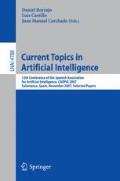Abstract
Transformation Based Learning (TBL) is an intensively Machine Learning algorithm frequently used in Natural Language Processing. TBL uses rule templates to identify error-correcting patterns. A critical requirement in TBL is the availability of a problem domain expert to build these rule templates. In this work, we propose an evolutionary approach based on Genetic Algorithms to automatically implement the template selection process. We show some empirical evidence that our approach provides template sets with almost the same quality as human built templates.
Access this chapter
Tax calculation will be finalised at checkout
Purchases are for personal use only
Preview
Unable to display preview. Download preview PDF.
References
Brill, E.: Transformation-based error-driven learning and natural language processing: A case study in part-of-speech tagging. Computational Linguistics 21, 543–565 (1995)
Brill, E., Resnik, P.: A rule-based approach to prepositional phrase attachment disambiguation. In: Proceedings of COLING 1994, Kyoto, Japan (1994)
Ramshaw, L., Marcus, M.: Text chunking using transformation-based learning. In: Yarovsky, D., Church, K. (eds.) Proceedings of the Third Workshop on Very Large Corpora, New Jersey, Association for Computational Linguistics, pp. 82–94 (1995)
Megyesi, B.: Shallow parsing with pos taggers and linguistic features. Journal of Machine Learning Research 2, 639–668 (2002)
Holland, J.H.: Adaptation in Natural and Artificial Systems. University of Michigan Press, Ann Arbor (1975)
dos Santos, C.N., Oliveira, C.: Constrained atomic term: Widening the reach of rule templates in transformation based learning. In: Bento, C., Cardoso, A., Dias, G. (eds.) EPIA 2005. LNCS (LNAI), vol. 3808, pp. 622–633. Springer, Heidelberg (2005)
Wilson, G., Heywood, M.: Use of a genetic algorithm in brill’s transformation-based part-of-speech tagger. In: GECCO 2005. Proceedings of the 2005 conference on Genetic and evolutionary computation, pp. 2067–2073. ACM Press, New York (2005)
Milidiú, R.L., Julio Cesar Duarte, R.C.: Machine learning algorithms for portuguese named entity recognition. In: TIL 2006. Fourth Workshop in Information and Human Language Technology, Ribeirão Preto, Brazil (October 23-28, 2006)
Author information
Authors and Affiliations
Editor information
Rights and permissions
Copyright information
© 2007 Springer-Verlag Berlin Heidelberg
About this paper
Cite this paper
Milidiú, R.L., Duarte, J.C., Nogueira dos Santos, C. (2007). TBL Template Selection: An Evolutionary Approach. In: Borrajo, D., Castillo, L., Corchado, J.M. (eds) Current Topics in Artificial Intelligence. CAEPIA 2007. Lecture Notes in Computer Science(), vol 4788. Springer, Berlin, Heidelberg. https://doi.org/10.1007/978-3-540-75271-4_19
Download citation
DOI: https://doi.org/10.1007/978-3-540-75271-4_19
Publisher Name: Springer, Berlin, Heidelberg
Print ISBN: 978-3-540-75270-7
Online ISBN: 978-3-540-75271-4
eBook Packages: Computer ScienceComputer Science (R0)

